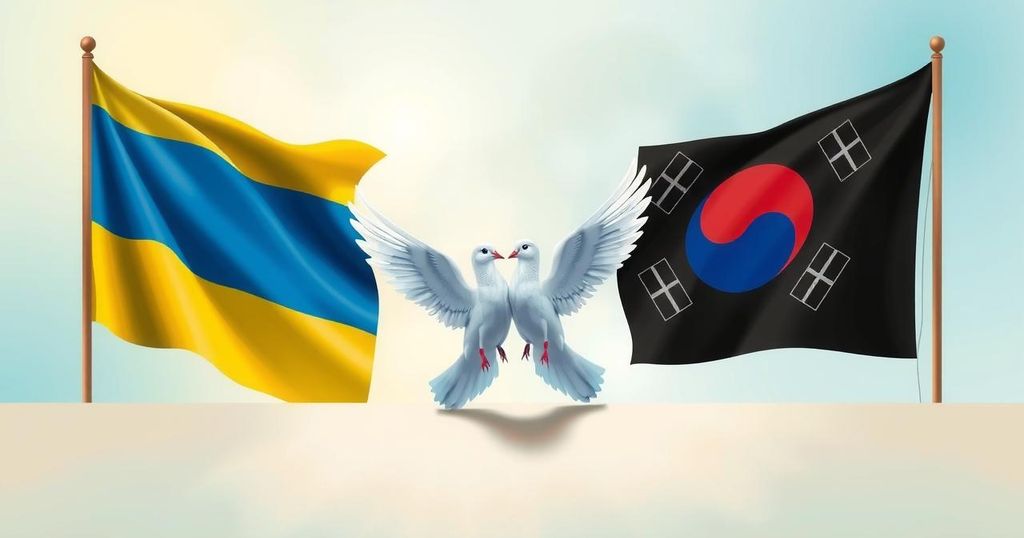World news
AND, ANDRII SYBIHA, ASIA, BIDEN ADMINISTRATION, CHO, CHO TAE - YUL, DEFENSE, DPRK, ENERGY INFRASTRUCTURE, EUROPE, EUROPE/ASIA, KOREA, NORTH, KOREA, SOUTH, MILITARY, NATIONAL INTELLIGENCE AGENCY OF, PYONGYANG, RUSSIA, SBU, SEOUL, UKRAINE, VOL, VOLODYMYR ZELENSKY, WAR, YO, YONHAP NEWS AGENCY
Lena Nguyen
0 Comments
Ukraine and South Korea Discuss Repatriation of North Korean Soldiers
On March 17, 2025, South Korea and Ukraine discussed the repatriation of two North Korean soldiers captured during their ongoing conflict. South Korean Foreign Minister Cho Tae-yul highlighted the complexities of asylum processes under South Korea’s constitutional framework. The discussions are influenced by North Korea’s significant troop deployment to support Russia. The captured soldiers’ expressed desire to relocate remains uncertain, impacting diplomatic relations and humanitarian considerations.
On March 17, 2025, diplomats from South Korea and Ukraine convened to discuss the potential repatriation of two North Korean soldiers captured during the Ukraine-Russia conflict. South Korean Foreign Minister Cho Tae-yul and his Ukrainian counterpart, Andrii Sybiha, acknowledged the complexity of the scenario involving the consideration of these prisoners from the Democratic People’s Republic of Korea (DPRK).
Minister Cho highlighted the constitutional implications of this matter, explaining that, according to South Korean law, North Koreans are regarded as South Korean citizens. However, he noted, “the prisoners must express a desire to relocate,” emphasizing the necessity for the soldiers to wish to seek asylum as a prerequisite for their potential resettlement in South Korea.
The initiative to involve North Korean soldiers stems from significant troop deployments by Pyongyang to assist Russian military operations, notably as Russia contends with severe manpower shortages. Reports suggest that approximately 12,000 North Korean troops were dispatched to Russia’s Kursk Oblast last fall, coinciding with Ukraine’s incursions across the border.
Following the complex military engagements, over 4,000 North Korean soldiers reportedly suffered casualties, with a staggering two-thirds estimated to have been killed, as noted by Ukrainian President Volodymyr Zelensky. On January 11, 2025, Ukraine captured two North Korean soldiers alive, marking a significant event as they received necessary medical attention and were placed in the custody of the Security Service of Ukraine (SBU).
Historically, South Korea has been involved in North Korean affairs and has welcomed approximately 34,000 defectors since the late 1990s. This creates both a precedent for accepting the soldiers and potential diplomatic risks, as doing so may enhance South Korea’s humanitarian image but could also provoke retaliatory actions from the North.
The willingness of South Korea to repatriate these soldiers is contingent upon their expressed desire to defect, which, according to the National Intelligence Agency of South Korea, they have not yet indicated. Such a lack of intention complicates the negotiations further, as there are concerns regarding continued troop deployments from North Korea to Russia, following prior heavy casualties.
Reports from the frontlines indicate that North Korean troops have been significantly active, with Ukrainian official Andriy Kovalenko commenting on their assault tactics, stating, “they are storming the frontlines in ‘columns.'” This acknowledgment underscores their influential role in ongoing hostilities.
Analysts caution that the North Korean military appears to be suffering unprecedented losses, likely due to a lack of battlefield experience and ineffective combat strategies. This situation intensifies security concerns not only for Ukraine but also for regional neighbors in Europe and the broader Indo-Pacific region.
In a discussion on the social media platform X, Sybiha expressed his appreciation for South Korea’s partnership while highlighting the growing cooperation between Russia and North Korea as a threat to regional stability. The uncertainty surrounding the response of the captured soldiers to potential relocation remains a point of intrigue, with suggestions that North Korea could leverage this situation strategically.
Yeonmi Park, a North Korean defector, expressed her concerns via Twitter, accusing Ukraine of breaching international law by linking the prisoner repatriation with potential arms dealings. This highlights the precarious balance between humanitarian and military considerations.
Zelensky acknowledged the risks involved in capturing North Korean personnel, stating, “This was not an easy task: Russian forces and other North Korean military personnel usually execute their wounded to erase any evidence of North Korea’s involvement…” This statement reflects the significant dangers faced not only by Ukrainian forces but also by the captured soldiers.
The ongoing negotiations and the decision-making process surrounding the fate of the North Korean soldiers are likely to influence the broader geopolitical landscape. North Korea’s silence on the proposal from South Korea is notable, illustrating the complex interplay of loyalties, humanitarian ideologies, and warfare strategies in the region.
The negotiations between Ukraine and South Korea regarding the repatriation of North Korean soldiers reflect the intricate balance between humanitarian concerns and geopolitical strategy. South Korea’s constitutional position regarding North Korean citizens adds complexity to the discussions, particularly given the soldiers’ need to express a desire to defect. Amid escalating military tensions, the situation underscores the broader implications of North Korea’s military involvement in the Ukraine conflict and the possible repercussions on international relations.
Original Source: evrimagaci.org




Post Comment